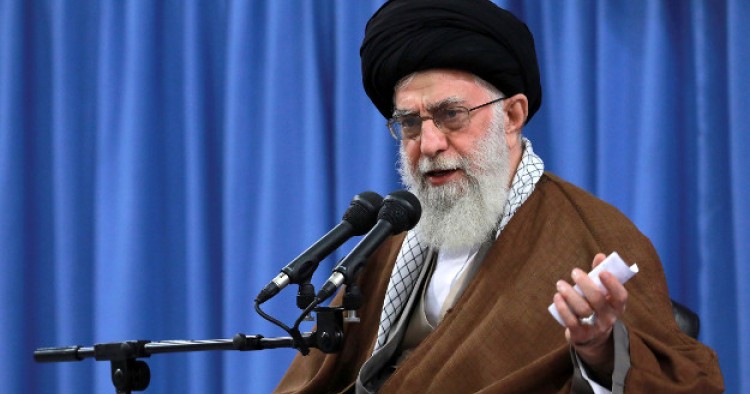Iran’s Supreme Leader Ali Khamenei today called on next month’s presidential candidates to make a pledge not to seek foreign investment to bolster the country’s fragile economy and instead to promote self-sufficiency and domestic production. All candidates “should promise that they will not look abroad but will focus on national capabilities and capacities in order to develop the country, improve the economy and solve the problems,” he said. Khamenei also warned the United States that it would regret any acts of aggression against Iran and blamed the U.S. and Israel for disunity within the Islamic world, particularly in the Middle East. “Creating terrorist groups in the name of Islam and sowing discord between Islamic countries – including Iraq, Syria, Bahrain and Yemen – are among plots by ruthless America and the evil Zionist regime to counter Islam.”
Comment: The Rouhani government hoped that the nuclear accord would serve as a catalyst to end Iran’s isolation from international financial markets and attract foreign investment in Iran to shore up the country’s economy. But while most of nuclear-related sanctions were lifted in January 2016, unilateral American sanctions related to Iran’s missile program, human rights abuses, and support for terrorism remain in place. These existing sanctions, coupled with the Trump administration’s tougher policy vis-à-vis Tehran, have dissuaded international companies and investors to do business with the Islamic Republic.
As Iran’s May 19 presidential elections are approaching, President Hassan Rouhani’s conservative rivals are increasingly using the slow pace of economic recovery in the country as their main campaign slogan to unseat the incumbent, who is seeking a second term. Although Iran’s GDP has increased and inflation has dropped to single digits since the signing of the nuclear deal, increased government revenues have not benefited ordinary Iranians and average growth in the non-oil sector remains below one percent. In a recent opinion survey by IranPoll, 72 percent of Iranians said the economic situation of ordinary people had not improved as a result of the nuclear deal.
Although Khamenei approved the nuclear deal the Rouhani government signed with the United States and five other world powers in July 2015, he has always remained skeptical of it.
Last month, Khamenei strongly criticized the Rouhani government for failing to effectively stimulate economic growth in the country and called on the president to focus more on self-sufficiency. “If all necessary measures regarding the resistance economy had been implemented, we would have witnessed a tangible difference in the country’s economic conditions and in people’s lives,” Khamenei was quoted in the Iranian media. “I have also told the honorable president that mentioning broad metrics [about economic growth in Iran] is good as long as the figures aren’t skewed; but they still do not have any impact on people’s lives in the short and immediate terms,” he told a gathering of Iran’s Assembly of Experts. The Supreme Leader urged the government to take practical measures to accelerate productivity and job creation so that “people feel their impact in their lives.”
The term “resistance economy” is often used by Iran’s top clerics and military leaders to emphasize policies that help promote self-sufficiency to counter international economic sanctions. In early 2014, Khamenei issued a decree that outlined general policies for the “resistance economy” that required the government to diversity Iran’s exports, reduce the country’s dependence on foreign imports of raw materials, and develop knowledge-based high-tech industries. The Supreme Leader named the current Persian year – which ends on March 20 – the “Year of Resistance Economy: Action and Implementation.” This shows that Khamenei, who has the final say on all state matters, does not want the nuclear deal to divert attention from the regime’s efforts to reduce its vulnerability to external pressures and economic sanctions.
The Middle East Institute (MEI) is an independent, non-partisan, non-for-profit, educational organization. It does not engage in advocacy and its scholars’ opinions are their own. MEI welcomes financial donations, but retains sole editorial control over its work and its publications reflect only the authors’ views. For a listing of MEI donors, please click here.













